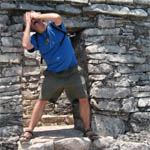Got an e-mail from Bob a couple weeks ago, asking if I’d like a copy of a book called Poems of Awakening: An International Anthology of Spiritual Poetry, edited by Betsy Small, in hopes I’d review it for Elephant Journal. Like I always say, if it’s for free, it’s for me, so told him sure, send it on.
O Marvel! a garden amidst flames!
Muhyiddin Ibn ‘Arabi (all quotes in this review are taken from Poems of Awakening)
Which is not to say the crusty, skeptical English professor in me didn’t have misgivings about the venture, questions buzzing in my mind like just whaddaya mean by “awakening”…or “spiritual”…or “poetry”? Was this going to be a collection of preachy dogma shoved down the reader’s throat with only the thinnest aesthetic veneer? Or, worse, a lot of feel-good doggerel, empty affirmations taken down off those colorful office posters and forced to rhyme? Or, worst of all, as tends to happen all too often in the touchy-feely passive aggressive world of alternative spirituality, could it be both at once?
Ask the world to reveal its quietude—
not the silence of machines when they are still,
but the true quiet by which birdsongs,
trees, bellworts, snails, clouds, storms,
become what they are, and nothing else.
Wendell Berry
As it turned out, I was very pleasantly surprised. Small’s reach is admirably broad, bringing Sufi mystics together with canonical American poets and contemporary yogis who write poems with titles like Savasana without watering down or homogenizing. And, most impressively, she makes it work. Her choice and arrangement of poems not only makes such a broad array fit, but turns it into something more than a simple compilation.
Whoever you are, no matter how lonely,
the world offers itself to your imagination.
Mary Oliver
The anthology is arranged in seven sections, each representing a different “kind of awakening.” I’d be more inclined to say that each is an inquiry, its contents offering a broad variety of answers, each of which raises new questions of its own. Throughout, Poems of Awakening bypasses didacticism and religiosity in favor of gently opening doorways.
From this hour I ordain myself loos’d of limits and imaginary lines…
Walt Whitman
What’s more impressive than the overt ordering of the anthology, though, are the subtler threads of style, theme, and imagery that connected one poem to another within sections, often across very disparate traditions, weaving a subtle tapestry that’s considerably more than the sum of its parts. And those parts are almost uniformly strong—every one of the poets far too inspired and far too skilled, in fact, to use tired metaphors about “weaving subtle tapestries” or clichés like “more than the sum of its parts” like yours truly just did.
…and I wrote the first faint line,
faint, without substance, pure
nonsense,
pure wisdom…
Pablo Neruda
In a brief and helpful introduction, Small, a yoga teacher with a creative writing background, introduces herself and describes the journey toward this volume: begun as a practical collection of readings to use in yoga classes, and expanded from there. And, the anthology bears this out, with an amazing amount of stuff that would go perfectly at the beginning or end of asana practice as well as a good amount of stuff that might be best enjoyed just sitting back with a cup of tea (though, of course, not everyone would agree which is which…and that’s exactly as it should be).
And only to the heart that knows of grief,
Of desolating fire, of human pain,
There comes some purifying sweet belief,
Some fellow-feeling beautiful, if brief.
And life revives, and blossoms once again.
Emily Pauline Johnson (Tekahionwake)
Which is not to say I necessarily liked or agreed with every selection. Then, that, too, is as it should be. If every poem is a door, it’s reasonable to expect that some will have tigers behind them—some might appear to be filled with bullshit, even, but even they might be worth a look. While accessible enough to open the eyes of the typical modern American yogi who was immunized against poetry in ninth grade English class, this is not a collection of airy feel-good aphoristic verse. In fact, there’s a lot to be enjoyed by even those who are typically scared off by the word spiritual (like the aforementioned crusty skeptical English professor).
The whole moon and the entire sky
Are reflected in dewdrops on the grass,
Or even in one drop of water.
Dogen Zenji
These are poems with depths worth exploring over and over. Some are sweet to the initial taste, while, with others, it might be a bit more difficult to find the jewel in the lotus (don’t remember anybody in the book using those clichés, either…). And some may be a bit of both. Personally, I’m still wrestling with Susan Griffin’s Great As You Are, which begins with the awesome “Be like a bear in the forest of yourself,” and then somehow ends up talking about starships. Like yoga, this is work that soothes and stimulates, and can be as difficult as you want.
Ah, grey sacrament of the mundane!
Al Zolynas
Small suggests a couple of different ways to use the book. For a first journey through, given its skilled and intricate arrangement, I’d recommend reading Poems of Awakening from beginning to end, even if, like me, you’re the kind of person who’d normally be inclined to read poems at random. Its real value, though, will be found in keeping it around—in the yoga studio, where it’ll be a valuable teaching resource, or by the bedside, or in the bathroom—where it can be picked up any time.
The story ends inside the book,
But outside, wherever you are—
It goes on.
William Stafford










Read 4 comments and reply